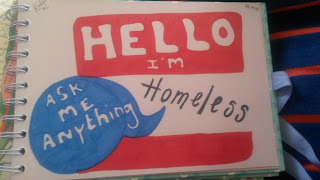Transatlantic Practice Exchange Day One: Why I'm Here
For the next two weeks I’m in Grand Rapids, Michigan, as part of the Transatlantic Practice Exchange #homelesslearning
The exchange is a programme run by Homeless Link and the National Alliance to End Homelessness, five UK participants and five US participants take a trip to one another’s countries to share approaches to ending homelessness.
I’m here to look at Strength’s Based Case Management.
When I made the first phone call to my hosts they made an
excellent point: “every organisation says that they’re strength’s based” and
this got me thinking, no organisation would outwardly admit to being deficit
based, admit to basing their approach and philosophy on people’s apparent needs
and weaknesses and problems. Most organisations will list their values as being
based on empowerment, being strengths based, asset based, solution focussed,
person centred and that’s great. But that’s the easy part.
A couple of weeks ago I was watching one of the many trashy documentaries
I watch on Netflix. Namely “Lock up”. Excessive jump cuts, cheesy
key-turning-in-lock sound effects and Hollywood movie trailer voice over aside
it offers some unique insights into life for people caught up in the American prison
system.
On tonight’s episode a young man called Ricky was being
admitted to the juvenile detention unit of a local jail for the fifth time in
his short life. The staff described themselves as “puzzled” and “perplexed” as
to why Ricky kept returning to jail because he was so smart, had so much
insight was, creative, likeable and personable.
Ricky talked about his life outside of the prison; a life
where he had been rough sleeping since his early teens, had been the victim of
repeated acts of violence and abuse, had been let down repeatedly by family
members, teachers, social workers and almost every adult he had come into
contact with. He had turned to alcohol to help him cope. He had suffered with
depression and anxiety all his life.
It was heartening to hear the staff at the prison list some
of Ricky’s assets and recognise some of his strengths. I’m sure there are many
similar institutions where staff could not even tell you the first name of the
people in their care; but I was puzzled by the staff’s puzzlement, perplexed by
the fact they were perplexed.
Ricky lives in a world where neither the prison system or his
community offers him any opportunity to demonstrate the people skills,
creativity, expertise, resilience or bravery he so obviously has.
Recognising that someone is intelligent or witty or
articulate or funny, or a fast learner, or an amazing musician or a talented
poet, is great. Building opportunities for them to use their strengths in a
meaningful way is the tough part.
At home in Stoke-on-Trent I work for an amazing organisation called VOICES we work alongside the Expert Citizens, a company made up of people with lived experience who use their innumerable strengths to influence system change. I've seen the difference that giving people a platform to use their strengths makes and I want to learn more about how we make that a priority for services and a reality for everyone.
I’m here to look at Strength’s Based Case Management. And I
can’t wait to get started.






Comments
Post a Comment